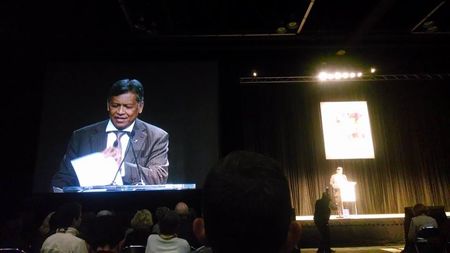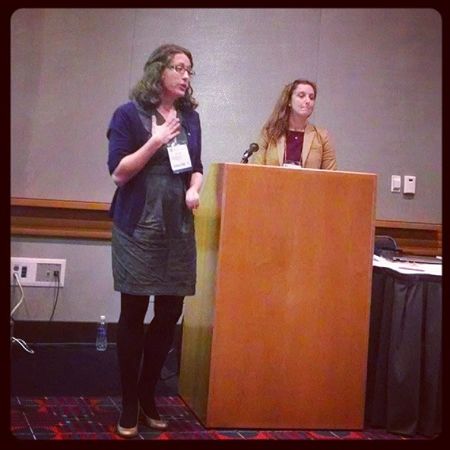I'm starting an all new direction in my life: I have accepted a full-time position here in Florida, and my goal is going to be to remain here as long as possible. I certainly still intend to take international vacations whenever possible, but I'm planning to work in the US from here on out. This has been my plan for some time, but it wasn't until today - when I was actually offered a job - that this plan became reality. Since I'll be [mostly] in the US from here on out, International Cat Lady isn't exactly appropriate. As such, I've decided to continue blogging at American Cat Lady. I hope you'll follow me over there.
Monday, April 28, 2014
Monday, April 21, 2014
Florida and the lack of opportunities for ESOL teachers and students
I recently wrote my last ever paper as a Master’s student on
a topic that is very important to me professionally: the state of Florida’s
policies towards English language learners in the public K-12 system. I could
copy and paste my paper here, but I suspect that most of the people who bother
to read my blog don’t come here for academic writing and education jargon.
However, since this is a topic that I think is pretty important, I’ve decided to
convert my academic paper into a more accessible blog post.
Something like 220 languages are spoken in the state of
Florida. There are roughly 270,000 students in Florida’s public K-12 system
that are considered English Language Learners (ELLs). That’s roughly 10% of the
K-12 population. You would think that this would translate into a lot of
available jobs for people like me: experienced, qualified ESL teachers. Sadly,
that’s not the case. What is typically seen are ads for content-area teachers
holding ‘appropriate ESOL certification.’ There’s little to no demand for ESL
teachers in the K-12 system at all, just regular teachers with this ‘appropriate
ESOL certification.’ Why is that? What does having ‘appropriate ESOL
certification’ actually entail? And is this what is best for Florida’s
students?
Prior to 1990, the way ELLs were treated in the public K-12
system varied substantially by district, as there was no state level legislation
pertaining to how they should be treated. Some districts had really great
programs, including bilingual education, sheltered content instruction (in
which subject matter such as Math or Social Studies was taught to ELLs
specifically by an ESOL professional), and pull-out programs (in which students
were pulled out of mainstream classes during the day for one-on-one tutoring or
tutoring among a group of their ELL peers). Other districts had nothing;
students were simply tossed into mainstream classes with teachers who had no
training in dealing with ELLs. A group of advocates filed a lawsuit against the
State of Florida in the late 1980s, arguing that as legal residents of the
state, ELLs were entitled to equal access to education, understandable
instruction, and intensive English language instruction. They won their suit,
and in 1990, the Florida Consent Decree was enacted. The Consent Decree
mandated equal access, comprehensible instruction, and language instruction for
ELLs, and required that the state’s K-12 teachers actually have some sort of
training for working with ELLs. Elementary school teachers, as well as middle
school and high school language arts teachers were required to have 300 hours
of training for working with ELLs. Middle and high school math, science, and
social studies teachers were required to have 60 hours of training, and all
other instructors were required to have 18 hours. Sounds great, right? In
theory, perhaps, but not so much in actual fact.
One of results of the Consent Decree was that the Florida
Department of Education (FDOE) began pushing for mainstreaming of ELLs across
the state. While it was left up to each district as to the specifics of how
they would comply with the Consent Decree, there was a lot of pressure for
districts to work towards mainstreaming of ELLs. (Mainstreaming – sometimes referred
to as inclusion – is the practice of putting ELLs in regular classes with
native speakers.) The pressure to increase mainstreaming actually led to many
quality bilingual, sheltered, and pull-out programs being dismantled and
replaced with mainstreaming. After all, if all teachers are now “qualified” to
teach ELLs, this should be fine, right?
Well, just how “qualified” are they? Is receiving 300/60/18
hours of instruction in working with ELLs enough? And what kind of instruction
is that, anyway? Since 1999, all university teacher training and certification
programs in the state of Florida are required to provide their pre-service
teachers with their needed hours of ESOL training. However, pretty much all of
the universities did this not by adding 300 hours’ worth of required coursework
for their students, but instead by creating an ‘ESOL Infused’ program. This means
that topics pertaining to education of ELLs would be included in general
Education courses; very few of those 300/60/18 hours would be earned in a class
that actually focused in its entirety on teaching ELLs.
The university where I’ve just earned my MA in TESOL requires
its undergraduate Education majors to take only two courses that are
ESOL-specific. I just spent the past two semesters teaching one of those two
courses, and let me tell you, my students – junior and senior Education majors –
had no clue about teaching ELLs when
the semester began. Even at the end of the semester, there are very few of my students whom I would
recommend to work with ELLs, and yet most of them are now “qualified” to do so
according to state regulations.
While writing my paper, I read a lot of articles, including
a lot of published research on the views that teachers and program
administrators had of both mainstreaming and of the required ESOL training. The
majority of teachers and administrators did not approve of mainstreaming – with
the biggest complaint being that mainstream teachers lacked the time and/or the
skill to properly modify their lessons for their ELLs. The majority of teachers
themselves also complained that they did not feel adequately prepared to work
with their ELLs. One article I read referred to the results of the Consent
Decree as the “the
deprofessionalization of ESL teachers, rather than the specialization of
mainstream teachers” – and sadly, that seems to be the case.
Oh, and
the FCAT? That standardized test that one must pass in order to graduate from
high school in the state of Florida? ELLs are given one year – ONE YEAR – to get
their language skills up to par to pass the FCAT. Research in the field of
second language acquisition shows that it typically takes 5-7 years to master a
second language, yet ELLs are given just one to take a test that is often
challenging to native speakers. Seriously?
Labels:
education,
Florida (FL),
Southeastern USA,
TESOL,
United States
Wednesday, April 16, 2014
Almost done!
Last Friday I took my comprehensive examination for my Master's degree, which was (as you might expect) a Big Freakin' Deal. Essentially, if you don't pass, you don't graduate. While I never thought that failing was a possibility, I was still pretty stressed out over it. Not to worry; I passed :-) I have not yet received my official score (one can fail, or one can receive a low pass, a pass, or a pass with distinction), but I have been unofficially told that everyone who took the exam last Friday received a passing score. Official scores should be out by the end of the week. Now that comps are over, my to do list has shrunk to an amazingly small size: finish writing a paper (it's almost done; all I have to write is my conclusion and then proofread the thing), teach one class, attend one class as a student, and administer a final exam to my students. And find a job.
I thought job hunting was stressful back in February. Now that it's April, the stress level has increased exponentially. There still aren't many jobs in TESOL in the US, the positions are very competitive, and I am developing an ever increasing urge to punch the people who design some of these job application websites. (The last job I applied for required me to submit a US state, zip code, and telephone number for each of my former jobs... a bit of a challenge for those positions in South Korea, Kyrgyzstan, and Russia. In order to get the website to accept my application, I had to enter false information... and then click a checkbox certifying that all of the information I had entered was accurate. Grrrr.)
I'll be moving out of Orlando and back 'home' to Georgia at the beginning of May, where I will remain until I find a job. Moving is an expensive and annoying process, and I would have loved to move straight from Orlando to the location of my next job, but unless something appears in the next two and a half weeks, it seems that wherever I end up, I'll be getting there by way of Georgia. Whatever happens, though, the graduate school phase of my life is nearly over; time for a new chapter to begin!
Labels:
Florida (FL),
Georgia (GA),
grad school,
jobs,
Southeastern USA,
TESOL,
United States
Thursday, April 3, 2014
The Adventures of Charlie and Mochi
Don't forget! Charlie and Mochi now have their own Facebook page! If you haven't already 'liked' it, click here for all the mustachioed cat and underbite-faced dog action you could possibly desire!


Monday, March 31, 2014
Food, friends, and frolics in Portlandia
While I have mixed feelings about the fact that I shelled out a rather large sum of cash to attend the TESOL 2014 conference, my feelings about Portland itself are not mixed at all: I love Portland. Portland is a pretty awesome town on just about every level and I had a fantastic time there. I could definitely see myself living there, except for the fact that the cost of living is a bit too high for me and I would be absurdly obese from all of the amazing food available. In addition to seeing Portland itself, I got to meet up with several people whom I hadn't seen in years, as well as one person whom I'd previously only known online, and we had a lot of fun.
On Wednesday night, after the keynote address (see my previous post), I met up with a blogger named Joy (of ForeignerJoy and AmericanJoy), whom I've known online for years now. We were in Korea at the same time, although we never met in real life. She is now in a Master's program for TESOL in Seattle - where she lives with her black and white mustachioed cat that she brought home from Korea :-) She and her boyfriend had come down for the conference, so we got together and wandered around downtown for a bit before settling at a delicious Mexican restaurant called Santeria. (Note: they give you a TON of food here - if you're staying in a hotel sans fridge and microwave and therefore can't take leftovers, order less and share!)
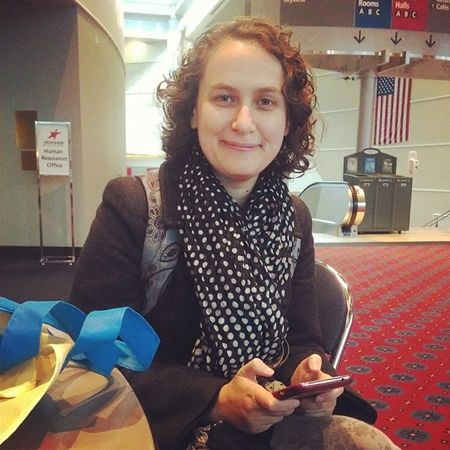
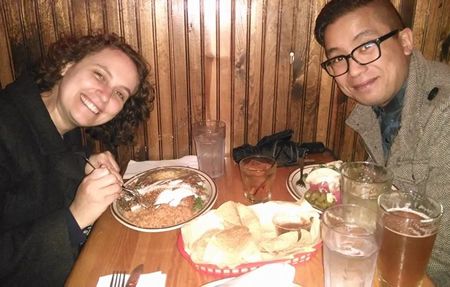

After I left Joy and her bf and hopped on the MAX (the light-rail) to head back to my hotel, I ended up having quite a bizarre ride. I've never had a public transit ride that was full of so many talkative, funny people - one of whom was a local ESOL teacher who was also attending the TESOL conference. We talked about bad smells, Israeli Mossad, ballroom dancing, and (of course) the TESOL conference, among other things. Then one guy says 'I'm gonna take a selfie, who's with me?' and everyone in the car got up, so I figured I would, too:
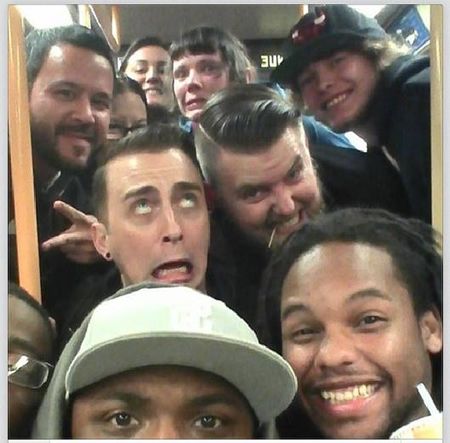
Wednesday night I realized (via Facebook) that Brooke - a friend and former coworker from my days teaching in Vladimir, Russia - was in Portland for the TESOL conference as well. She was presenting at the conference and had a pretty hectic schedule, but we agreed to meet up for lunch on Thursday. We decided to head for the Georgian food food-truck. Apparently food-trucks are a Hugely Big Deal in Portland, and you can get pretty much any kind of food from these things, and they are DELISH. Now, if you know me or have read any of my blogs for a while, you probably know that Georgian food is my absolute favorite food ever, although it is a huge challenge to find it in the US - especially in my part of the US. And Portland sells it out of the back of a food truck. Heaven! So not only did I get to see a really wonderful person whom I hadn't seen in ages, I also got to chow down on some exquisite Georgian food. Win!

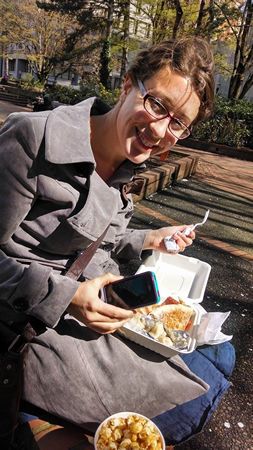

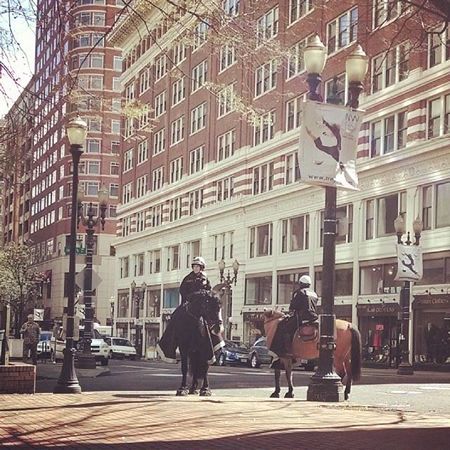
While we were eating, horse cops rode by!
Friday evening, I met up with Jill and Johnny - two friends of mine who moved to Portland from Florida ages and ages ago, and whom I hadn't seen since 2004. I had a great time catching up with them - and we had some great food, too, including some lovely Vietnamese dishes and the most amazing ice cream I've ever tasted at Salt and Straw. We finished the evening at some woman's house (the wife of a friend of a friend or something), drinking wine and discussing our favorite NPR personalities. I kid not.
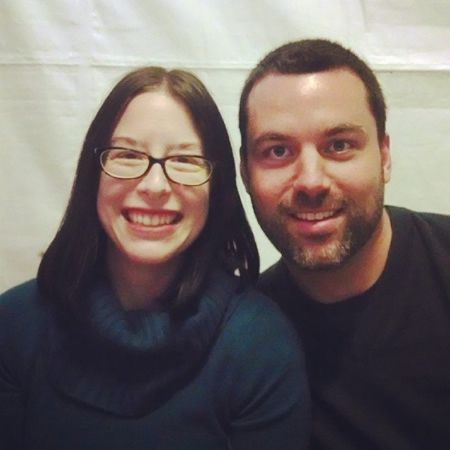
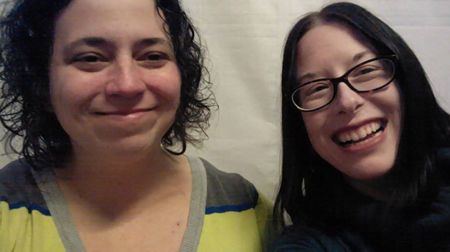

Some sort of Vietnamese mushroom dish
Saturday was pretty chill. I have my comprehensive exams for my MA coming up, so I spent some time studying for them. There was a local restaurant (the name of which I've sadly forgotten) located not far from my hotel where I had a wonderful brunch consisting of the best latte I had all week (and it's Portland, so I had some amazing lattes), as well as an omelette stuffed with some kind of specialty bacon and topped with salsa, fresh avocados, and sour cream. I camped out there for a while with my study notes.

That evening, my friend Linda (whose poetry blog is here, BTW) arrived. She and I knew each other ages ago when we both lived in San Diego, CA, and while we've kept in touch over the years (yay, internet!), I hadn't seen her since 2005. She now lives in southwestern Washington, and she drove down to spend some time with me. Earlier in the week, I had discovered that my hotel was within walking distance of an all-you-can-eat Indian buffet restaurant called Namaste, which was excellent. Linda mentioned having eaten at a delicious Indian buffet north of town on a previous trip to Portland, and upon hearing her description I was pretty sure it was the one near my hotel. So we walked to it, and it was! Nomnomnom.

Linda and Indian food, yay!
Linda and I had a great time catching up and sharing stories about all sorts of things from the past nine years of our lives. We also spent Sunday exploring downtown Portland. While the weather on Friday and Saturday had been pretty abysmal (even locals were complaining about how unusually heavy the rain was), Sunday was gorgeous. We drank a good bit of coffee, bought some specialty chocolate and some mouth-watering cupcakes, spent a bit too much money on souvenirs, and camped out for a while at a noodle shop. It was absolutely lovely. I could do that every day.... except that my bank account would probably rebel pretty quickly.




Funny Chinatown signage
Labels:
food,
Pacific Northwest,
Photography,
Portland,
TESOL 2014,
United States
Saturday, March 29, 2014
TESOL 2014: My Experiences
Those of you who follow me on Facebook know that I’ve spent
the last week in Portland, OR. For those of you who don’t, well, I’ve spent the
last week in Portland. I left Orlando on Tuesday, immediately following my
classes, and flew to Portland for the purpose of attending the TESOL 2014
international conference. I’ll blog a little later about my non-TESOL
conference experiences in Portland; this post will be limited to my conference-specific
experiences. I’ll post about the rest of my Portland adventures later.
I have mixed feelings about the conference. On the one hand,
I saw a lot of really great presentations on topics that I found quite
interesting. Additionally, I was able to meet up with some really fantastic
people and have some really informative conversations. (Where else can you have
an academic discussion about Konglish?) On the other hand, I came to the
conference specifically for the job fair, and to be honest, I found the job
fair disappointing. But more on that later.
Wednesday was a pretty slow day at the conference. I
explored the convention center, and found myself a nice spot to sit and dig
through the 200+ page schedule of events to plan which presentations I wanted
to go see. I met a guy from Florida who had watched my presentation back in
2012 at the Central Florida TESOL conference on Low-Tech and No-Tech TESOL in places such as Kyrgyzstan – and who remembered me and the presentation. I had
the aforementioned conversation about Konglish, with a fellow presenting a
poster on ‘Semantic Shift in Blended Languages in Korea’ (yes, by ‘blended
languages’ he meant Konglish), and I met a woman doing research on state policies
towards English language learners (ELLs) in Alabama (which seem just about as f’d
up as the state policies towards ELLs in Florida, but at least she had some
solid research to prove its f’d-up-ness). This was followed by the welcome reception
for first time attendees, which was rather pointless (they taught us how to use
the 200+ page schedule that most of us had spent the day familiarizing
ourselves with, yawn). I did, however, meet a woman seated at my table who
administrates the ESOL (English for Speakers of Other Languages) in a
north-Florida county. Sadly (for someone like me, looking for an ESOL
position), her county only hires mainstream teachers with ESOL endorsements, not
full time ESOL teachers.

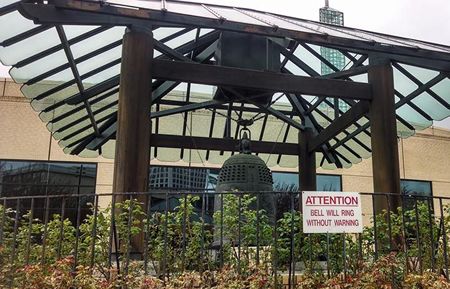
I never did hear it ring.
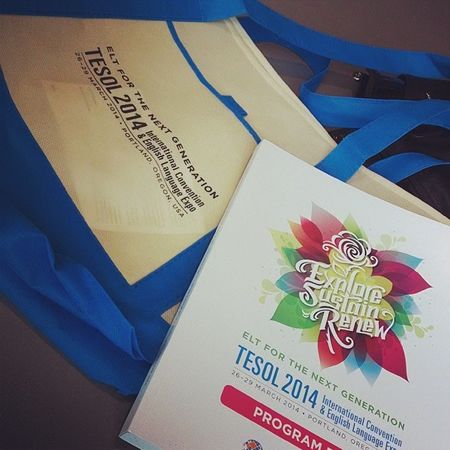
Convention Swag
After the welcome session, we had the keynote speech, given
by Surin Pitsuwan. It was a fantastic speech. Pitsuwan isn’t an ESL/EFL/ESOL teacher;
instead he’s the product of such education. He came from a working-class, rural
family in Thailand, where he was taught English by Peace Corps volunteers as
well as volunteers from Canada and the UK. This gave him the skills to apply
for a study abroad program in the US. Since then, he’s done all sorts of
things, including getting a PhD from Harvard, becoming a member of Parliament
in Thailand, and becoming Secretary-General of ASEAN. His point of view was
that those of us in this field are helping to spread a necessary skill, and
that he wouldn’t have achieved anywhere near what he has without the help from
the volunteers who came to his village when he was young. This made me feel
really great about some of the life decisions I’ve made (working in Russia for
a pittance, volunteering in rural Kyrgyzstan).
Thursday was a big day. It was the day that I had one
interview scheduled and when I planned to spend the afternoon cruising the job
marketplace, distributing my resume willy-nilly. However, in the morning my
goal was to attend several presentations. The first presentation I attended was
on ‘English only’ policies at Intensive English Programs (IEPs) in the US.
Ideally, I would like to find a job at an IEP, so this was something that was
quite interesting to me. The ‘English only’ concept (students may not speak in
their first language (L1) during class and are discouraged from using it while
at the facility or on IEP events) is essentially standard IEP policy across the
country. However, research has shown that allowing students to use their L1,
especially for school-related purposes (i.e., explaining directions or a
grammar rule to a classmate, or looking up definitions in a bilingual
dictionary) is actually very helpful to students. This isn’t really surprising,
especially since recent research in K-12 ESOL education has shown the
importance of incorporating a student’s L1 into their English education. The
sad thing is that despite the research, this policy remains in place – and both
teachers and students actually support it, despite its various downsides.
The next presentation that I attended was on transitioning
from teaching English as a Foreign Language (EFL; involves teaching overseas)
to teaching English as a Second Language (ESL; involves teaching in the US or
other predominantly English-speaking country). While I am not making a direct
transition (going as I did from overseas to grad school to the job search), I
felt that this was still an applicable topic. While I didn’t get much
information about the topic that I didn’t already know, I did learn that the
job market in my field here in the US is much tougher than I had expected. I
have applied to an absurd number of jobs in the southeastern United States.
While I haven’t heard back from most of them, I did hear from two (on Tuesday
as I was on my way to Portland) that they had selected someone else. I had been
hoping that was an anomaly, but according to this panel, jobs are few and far
between, and that’s to be expected. The presenters were all fellows with advanced
degrees and 10+ years of EFL experience, and they had all had trouble finding
jobs when they returned to the US. One had returned last June AND IS STILL
UNEMPLOYED. This made me feel rather panicky.
Next, I had planned to attend a presentation on the use of
movie trailers in the classroom, but by the time I got to the room in which
that presentation was being given, it was so packed that I couldn’t even make
it through the door. I opted instead for a presentation on Global Englishes
(different types of English spoken around the world, from the types that are
considered more prestigious like American and British English, to the types
that are often stigmatized, such as Indian or East Asian English). Sadly, I
missed the beginning of her presentation, but I arrived in time for an
interesting anecdote about teaching the phrase ‘on the bus.’ She discussed
experiences in India where one normally says ‘I am in the bus’ unless there is
no room and one must actually climb on to the top of the bus, in which case one
would say ‘I am on the bus.’ I loved this, mainly because I have had students
struggle with the fact that in American English we say ‘I’m in the car’ but ‘I’m
on the bus.’ I also had a couple of experiences in Russia and Kyrgyzstan where
I told people I was ‘on the bus’ (literally translating word for word into
Russian) and having them think I meant I was on top of the bus, as in Russian
you use the preposition ‘in’).
After lunch, it was time to find myself a job. Or so I
thought. I had decided to come to the TESOL 2014 conference specifically
because I was told that its job fair was absolutely the best place to find
jobs. Based on the explanations I had received, I envisioned an area of booths
manned by potential employers where you could talk to representatives, decide
if you were interested in working for them, and then arrange a time for an
interview. Sadly, it was not like this at all. You could only meet with the
employers if you had an interview scheduled with them, and there was no direct way
of scheduling an interview. After checking in at the job fair, I was directed
to a computer which gave me access to the TESOL website’s jobs section (which
believe me, I am already intimately familiar with). I was told to submit my
application to any employer marked as present at the convention, and that if
any employer was interested in interviewing me, they would call me. Nearly all
of the employers listed who were present at the convention were out of the
Middle East. As I am looking for work in the US, my options were incredibly
limited. Of the very few US-based employers on the website listed as present at
the convention, there were only two that I was interested in working for – and I
had already applied for positions with both. While one had already arranged to
meet with me during the convention (it was the only interview that I ended up
having), the other had never gotten back to me. I re-submitted my application,
stating that I was in town for the conference and would love an opportunity to
meet with them in person, but never heard anything back. At least I had the one
interview that I had arranged in advance. (It went really well, but they also
had a stack of resumes about an inch thick from all the other people they planned
to interview that day.)
I was feeling a bit discouraged after leaving the job fair
section, but since I knew there were a small handful of booths with recruiters
for other positions (all overseas) in the Expo section of the convention, I
decided to see what else I could find. I had some people from Saudi Arabia and
Oman attempt to recruit me, but like I said, that’s just not on my list of
places to go. I have mentioned before that I had applied for a competitive position
that is overseas. They, too, had a booth, so I decided to ask them about their
time-frame, as I hadn’t heard anything yet. On a positive note, they told me
that they were running behind. Normally they start interviewing people in
March, but this year (“due to the overwhelming number of applications”) they
wouldn’t be able to start conducting interviews until April. Then I asked them
about pets. Their website had said that they allowed pets, but strongly
discouraged them. I wanted to ask about this in person. Well, you can bring
your pets, but if you’re in a position in which you are told you must evacuate
(they just evacuated their personnel from Ukraine), you MUST leave your pets behind.
(The other option is refusing to evacuate, in which case your position will be
terminated.) Sorry, I’m not leaving Mochi and Charlie behind; I guess I can
rule that job off my list.
Friday had a whole slew of presentations on language
education policy in the US. I find language policy (and specifically language
education policy) incredibly interesting, so I decided to attend three of these
presentations. The first couple weren’t overly exciting, as they essentially
reiterated a lot that I already knew. The third, however, entitled ELLs and the
Law, was fascinating. They delved quite deeply into the legal reasons why
schools are required to provide special language education services to ELLs,
and what comprises the bare minimum of services allowed. Comparing what I
learned in that presentation to what I’ve learned in recent research on Florida’s
language education policies, it seems that Florida is skirting that bare
minimum line pretty damn closely.
After three presentations on language policy, I figured I
needed a change of pace. I attended a presentation on professor and resident
ESL students’ interactions in higher education. The presentation ended up
focusing a lot on the views professors held of ELLs who were legal residents or
US citizens versus ELLs who were international study-abroad students. It was
interesting – and a bit disturbing – to see that the professors almost
uniformly held much more negative views of their resident ELLs than they had of
their international student ELLs. Sadly, she didn’t delve into if this was
based on the actual performances of these students in the classroom, or if this
was merely the professors’ preconceived biases towards these students. (I also
found this interesting, because when I taught ESL in the US, my resident ELLs
vastly outperformed my international students, most of whom seemed to just be
in the US in order to party or go to Disney.)
The last presentation I attended was put on by Brooke – one of my former colleagues at the American Home in Russia, where I worked in
2005-2006! She and her classmate (both of them are PhD students at Penn State)
presented on ESL students’ reactions to the use of Global Englishes
(non-standard English) in their Freshman Composition class. They discussed
their ESL students’ reactions to readings from The Brief Wondrous Life of Oscar Wao and Sozaboy: A Novel in Rotten English. Despite the huge push for inclusion
of Global Englishes in ESL/EFL curricula (at least in a top-down sense), they
had quite a strong pushback from the students, who didn’t see reading such
texts as beneficial and not academic. In some ways, the students had a point –
learning to include aspects of their native language/dialect in their writing
is great from a creative-writing standpoint, but isn’t something that would be
beneficial in terms of learning to write a Political Science or Chemistry term
paper. The most interesting thing I found was that while the ESL students who
were exposed to this kind of writing resisted it and gave a lot of pushback,
the mainstream classes (native and fluent speakers of English) accepted these
stories with little to no pushback.
So there you go; that’s my round-up of my experiences at TESOL 2014. I’ll post
my non-conference related Portland adventures in a day or two :-)
Labels:
Pacific Northwest,
Portland,
TESOL,
TESOL 2014,
United States
Saturday, March 22, 2014
visits, springs, and things
Melissa, my friend and landlord (who lives in CA) was in town this weekend with her kids. Two of our childhood friends were in the area as well, so we all met up:
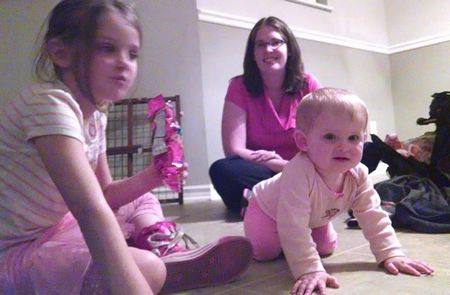

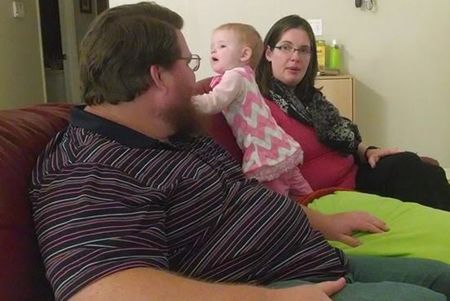
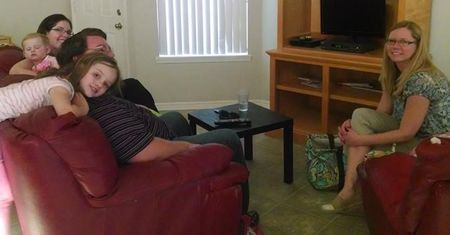
Melissa, Miriam, Chris, Madeline, and Melissa
The two Melissas had to head out around 2pm. After they left, Chris and I decided to visit some local springs and historic sites. First we went to Gemini Springs Park, which was really quite lovely. Swimming is prohibited, although pets are allowed AND they have an off-leash dog park section. I wish I'd known; I'd have brought Mochi.





This was actually *very* comfortable!
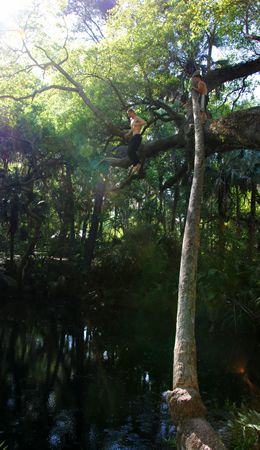
The guy in the black pants has just jumped.

Chris (not preparing to jump) on a tree on the far side of the spring.
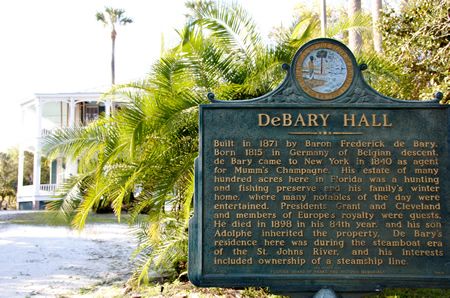
Then we drove to DeBary Hall
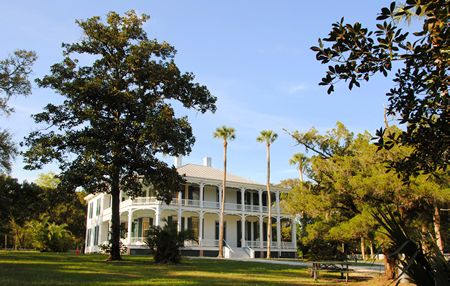
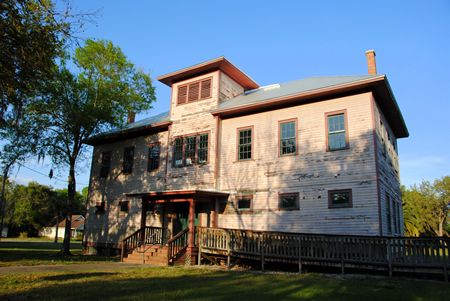
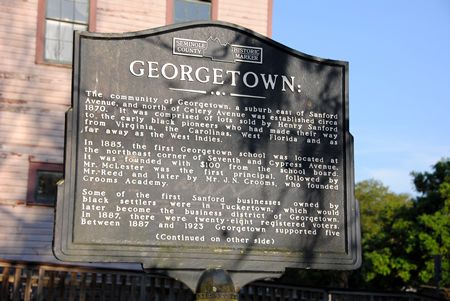
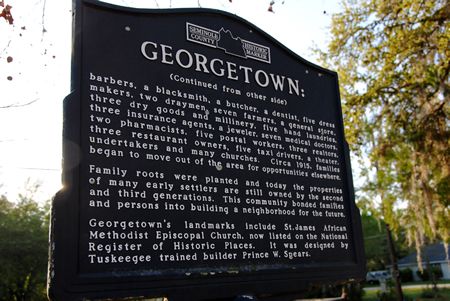
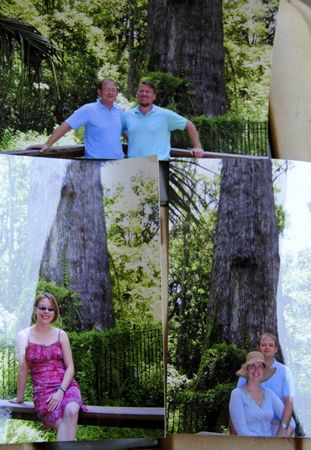
At least you can see the tree.

To read about his sad demise, click here.
Labels:
Florida (FL),
Orlando,
Southeastern USA,
springs,
United States
Tuesday, March 18, 2014
Republic Wireless: Pretty good for $25/mo
NOTE: I do not work for Republic Wireless. I am not getting paid to write this review. No one connected to Republic Wireless (or anything else) asked me to write this post, and I am not benefiting in any way from doing so. Why am I blogging about Republic? Because I am seriously impressed.
I hadn't had a smartphone since leaving Korea (and my Samsung Galaxy SII) behind in March 2012. I just had a cheap little pay-as-you-go 'burn phone' that could call and text and that was it. I liked having a smartphone in Korea, but I viewed it as a luxury that, as a grad student here in the states, I could no longer afford. And after having gotten into a long running war with T-Mobile over early termination of my contract before I moved to Korea in 2010, I did NOT want to get stuck in another cell phone contract... especially when I was still planning to move overseas again following graduation.
Last fall, a friend of mine posted a link to Republic Wireless on Facebook, which was the first time I'd heard of it. It's a phone company that integrates wifi and cell signals in a rather interesting way. If there's wifi around, the phone automatically uses it for data and calling purposes, and it switches over (seamlessly, as far as I can tell) to 3G or 4G (depending on your "plan") cell coverage when you move out of wifi range. You have to buy your phone outright, and the phone selection is limited (currently) to the Moto X and the Moto G. You then choose a "plan" (not a contract; you can cancel any time with no ETFs). One option includes unlimited talk, text, and data on the wifi + 3G plan for $25/mo. (If you want 4G it's $40/mo.) After spending something like $75 on my pay-as-you-go burner in December, I decided to make the switch. I started using Republic Wireless in January, but I didn't want to review it until I'd used it for a while - including up in rural GA, where I was worried about signal strength.
When I signed up for Republic, they were only offering the Moto X (which I got for $275, but which they are now selling for $299). They are now offering the cheaper Moto G as well, for $149. I chose the $25/mo plan... and it's been excellent. I keep wondering why everyone isn't using this service. Calls are clear, signal strength is great, all of my apps work wonderfully, and I even had a full strength 3G signal most of the time that I was in rural GA. When I'm in GA, I don't have internet at my house, so being able to have internet access there for the first time (even if just on my phone) was fantastic - especially since I wanted to follow Ukraine closely every waking moment.
The service is occasionally glitchy. Occasionally. The night that the Russians were entering Crimea, the 3G signal vanished completely. It was back by morning, but that was annoying. Also, at one point they had some sort of computer glitch which made my phone decide it wasn't able to make calls or record voicemail messages (although it could receive calls and use the internet). However, the Republic Wireless help center folks were very helpful, and got everything fixed within a couple of hours of my query. Those are the only two issues I've had with the phone, and they were short-lived. For $25/mo, I'd say that's a pretty good deal.
Also, the Moto X is a great phone. I had to install Greenify to improve battery life (I highly recommend Greenify!), but other than that the phone runs great. Also, its camera is better than my old point-n-shoot. It's not as good as my DSLR of course, but for those days when I don't want to lug a big camera around, this thing is a great substitute. That picture at the very top of this page of Charlie licking herself? That was taken with my Moto X. The videos in my Renfaire post? All shot with the Moto X.


I bought it a green and hot pink owl cover that includes four little black cats. I am also amazed that such wonderful things exist. Yay, interwebz!
Sunday, March 16, 2014
Bay Area Renaissance Festival 2014
Yesterday I went, with my father and brother, to the Bay Area Renaissance Festival in Tampa. We went together last year, although apparently I didn't blog about it. Last year, I discovered (and rather fell in love with) Sirena, the best act of the faire in my opinion. They put on a performance within five minutes of our arrival at the faire, and it was excellent. Seriously, they were the main reason I wanted to attend and their performance alone was worth the price of admission. I took a bunch of photos of them, as well as a few short video clips (below) - if you like that sort of thing, I definitely recommend buying their albums.

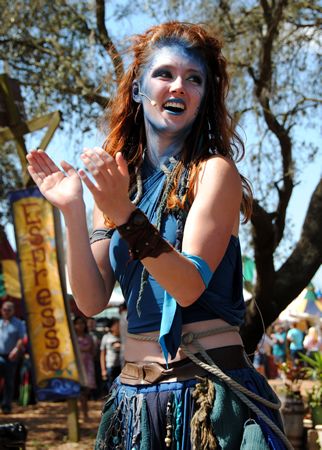

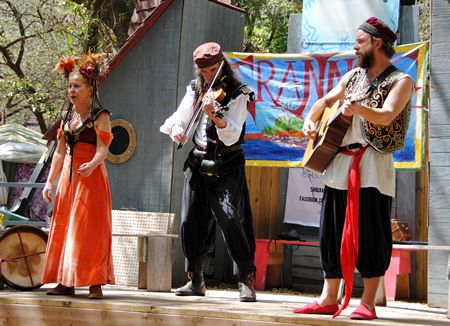

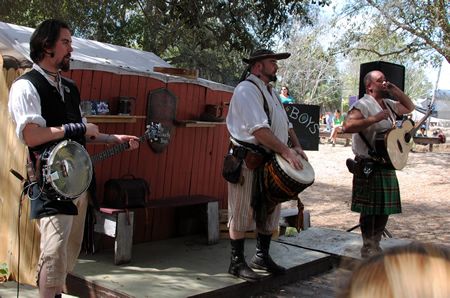
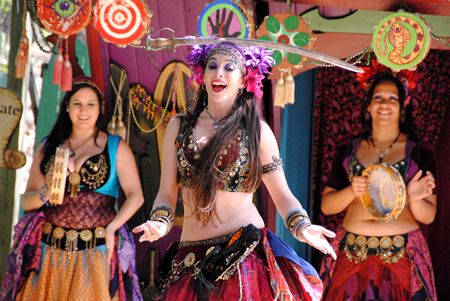

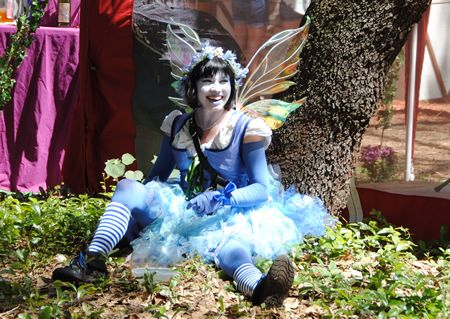

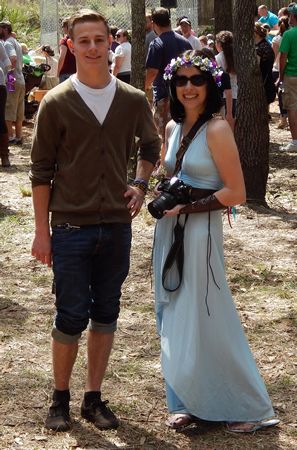
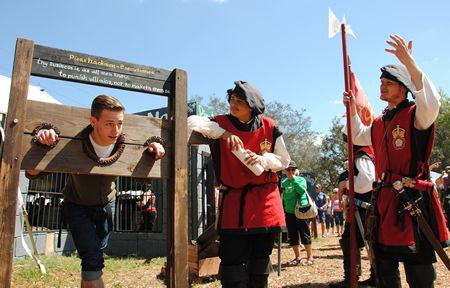
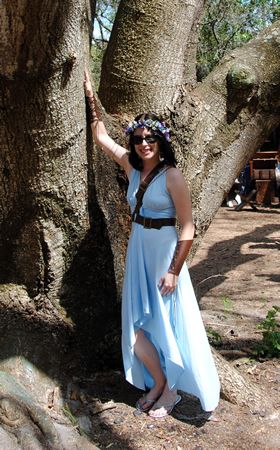

Labels:
dogs,
Florida (FL),
music,
Photography,
renfaire,
Southeastern USA,
Tampa,
United States,
youtube
Subscribe to:
Posts (Atom)
![international [cat] lady of mystery](http://2.bp.blogspot.com/-97QAEjg8P38/UuPcTG28J2I/AAAAAAAAADU/xuZTWt7y2IE/s1600/newblogtop2014b.jpg)
